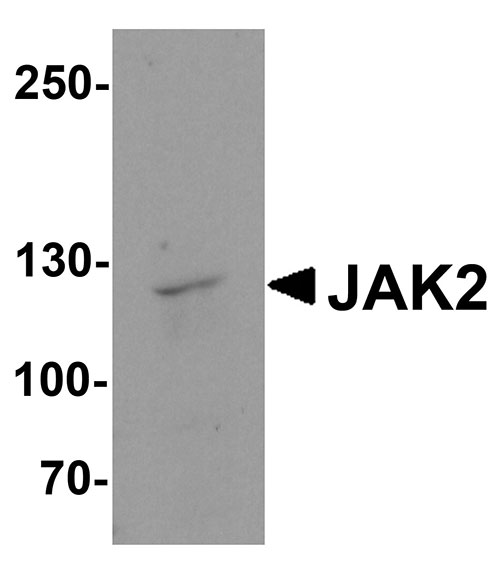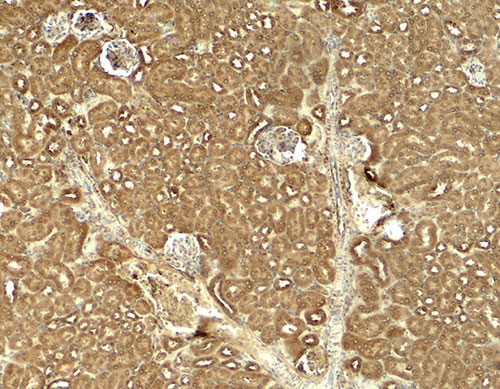JAK2 Antibody
- 产品详情
- 实验流程
- 背景知识
Application
| WB, E, IHC-P |
|---|---|
| Primary Accession | O60674 |
| Other Accession | NP_004963, 4826776 |
| Reactivity | Human, Mouse, Rat |
| Host | Rabbit |
| Clonality | Polyclonal |
| Isotype | IgG |
| Calculated MW | 130674 Da |
| Concentration (mg/ml) | 1 mg/mL |
| Conjugate | Unconjugated |
| Application Notes | JAK2 antibody can be used for detection of JAK2 by Western blot at 1 - 2 µg/ml. Antibody can also be used for immunohistochemistry starting at 5 µg/mL. |
| Gene ID | 3717 |
|---|---|
| Other Names | Tyrosine-protein kinase JAK2, 2.7.10.2, Janus kinase 2, JAK-2, JAK2 |
| Target/Specificity | JAK2; JAK2 antibody is human, mouse and rat reactive. JAK2 antibody is predicted to not cross-react with other members of the JAK family of proteins. |
| Reconstitution & Storage | JAK2 antibody can be stored at 4℃ for three months and -20℃, stable for up to one year. |
| Precautions | JAK2 Antibody is for research use only and not for use in diagnostic or therapeutic procedures. |
| Name | JAK2 (HGNC:6192) |
|---|---|
| Function | Non-receptor tyrosine kinase involved in various processes such as cell growth, development, differentiation or histone modifications. Mediates essential signaling events in both innate and adaptive immunity. In the cytoplasm, plays a pivotal role in signal transduction via its association with type I receptors such as growth hormone (GHR), prolactin (PRLR), leptin (LEPR), erythropoietin (EPOR), thrombopoietin receptor (MPL/TPOR); or type II receptors including IFN- alpha, IFN-beta, IFN-gamma and multiple interleukins (PubMed:15690087, PubMed:7615558, PubMed:9657743, PubMed:15899890). Following ligand- binding to cell surface receptors, phosphorylates specific tyrosine residues on the cytoplasmic tails of the receptor, creating docking sites for STATs proteins (PubMed:15690087, PubMed:9618263). Subsequently, phosphorylates the STATs proteins once they are recruited to the receptor. Phosphorylated STATs then form homodimer or heterodimers and translocate to the nucleus to activate gene transcription. For example, cell stimulation with erythropoietin (EPO) during erythropoiesis leads to JAK2 autophosphorylation, activation, and its association with erythropoietin receptor (EPOR) that becomes phosphorylated in its cytoplasmic domain (PubMed:9657743). Then, STAT5 (STAT5A or STAT5B) is recruited, phosphorylated and activated by JAK2. Once activated, dimerized STAT5 translocates into the nucleus and promotes the transcription of several essential genes involved in the modulation of erythropoiesis. Part of a signaling cascade that is activated by increased cellular retinol and that leads to the activation of STAT5 (STAT5A or STAT5B) (PubMed:21368206). In addition, JAK2 mediates angiotensin-2-induced ARHGEF1 phosphorylation (PubMed:20098430). Plays a role in cell cycle by phosphorylating CDKN1B (PubMed:21423214). Cooperates with TEC through reciprocal phosphorylation to mediate cytokine-driven activation of FOS transcription. In the nucleus, plays a key role in chromatin by specifically mediating phosphorylation of 'Tyr-41' of histone H3 (H3Y41ph), a specific tag that promotes exclusion of CBX5 (HP1 alpha) from chromatin (PubMed:19783980). Up-regulates the potassium voltage- gated channel activity of KCNA3 (PubMed:25644777). |
| Cellular Location | Endomembrane system; Peripheral membrane protein. Cytoplasm. Nucleus |
| Tissue Location | Ubiquitously expressed throughout most tissues. |
For Research Use Only. Not For Use In Diagnostic Procedures.
Provided below are standard protocols that you may find useful for product applications.
BACKGROUND
JAK2 is a member of the JAK family of kinases that also include JAK1, JAK3, and TYK2 (1,2). JAK kinases are activated following tyrosine phosphorylation of cytokine receptors after ligand binding. JAK2 activation promotes the recruitment and phosphorylation of STAT3 and STAT5. These transcription factors then translocate to the nucleus where they bind specific DNA promoter sequences resulting in the transcription of genes that regulate cell proliferation, differentiation, and apoptosis (3). Mice with a disrupted JAK2 gene exhibit embryonic lethality associated with the absence of definitive erythropoiesis (4).
REFERENCES
Wilks AF, Harpur AG, Kurban RR, et al. Two novel protein-tyrosine kinases, each with a second phosphotransferase-related catalytic domain, define a new class of protein kinase. Mol. Cell Biol. 1991; 11:2057-66.
Quintas-Cardama A and Verstovsek S. Molecular pathways: JAK/STAT pathway: mutations, inhibitors, and resistance. Clin. Can. Res. 2013; 19:1933-40.
Levine RL, Pardanani A, Tefferi A, et al. Role of JAK2 in the pathogenesis and therapy of myeloproliferative disorders. Nat. Rev. Cancer 2007; 7:673-83.
Neubauer H, Cumano A, Muller M, et al. Jak2 deficiency defines an essential developmental checkpoint in definitive hematopoiesis. Cell 1998; 93:397-409.
终于等到您。ABCEPTA(百远生物)抗体产品。
点击下方“我要评价 ”按钮提交您的反馈信息,您的反馈和评价是我们最宝贵的财富之一,
我们将在1-3个工作日内处理您的反馈信息。
如有疑问,联系:0512-88856768 tech-china@abcepta.com.























 癌症的基本特征包括细胞增殖、血管生成、迁移、凋亡逃避机制和细胞永生等。找到癌症发生过程中这些通路的关键标记物和对应的抗体用于检测至关重要。
癌症的基本特征包括细胞增殖、血管生成、迁移、凋亡逃避机制和细胞永生等。找到癌症发生过程中这些通路的关键标记物和对应的抗体用于检测至关重要。 为您推荐一个泛素化位点预测神器——泛素化分析工具,可以为您的蛋白的泛素化位点作出预测和评分。
为您推荐一个泛素化位点预测神器——泛素化分析工具,可以为您的蛋白的泛素化位点作出预测和评分。 细胞自噬受体图形绘图工具为你的蛋白的细胞受体结合位点作出预测和评分,识别结合到自噬通路中的蛋白是非常重要的,便于让我们理解自噬在正常生理、病理过程中的作用,如发育、细胞分化、神经退化性疾病、压力条件下、感染和癌症。
细胞自噬受体图形绘图工具为你的蛋白的细胞受体结合位点作出预测和评分,识别结合到自噬通路中的蛋白是非常重要的,便于让我们理解自噬在正常生理、病理过程中的作用,如发育、细胞分化、神经退化性疾病、压力条件下、感染和癌症。







